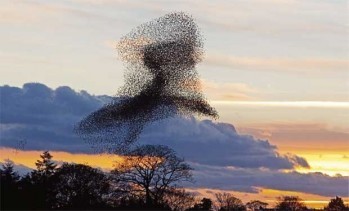Lockdown continues to be a bizarre experience for us all, and no less so in our household viewing experiences. My last article focused on viewing habits themed around death, notably Alan Ball’s Six Feet Under (2001-2005). Spurred perhaps by prior viewing or from sad news of terminal illness in the family, my partner and I continued down the rabbit hole of death reflections with Russian Doll (Headland, Lyonne and Poehler, 2019-), a time loop dramedy about a woman who is forced to experience her thirty-sixth birthday party repeatedly after dying in new and often hilariously unexpected ways (see montage below).
A separate piece of research in the offing is how essential death is to time loop narratives across a great many television series, but Russian Doll is unique because the entire show is dedicated to the premise of a repeated evening cut short by untimely (and increasingly unlikely) deaths. Why is this ‘death day’ so crucial to the development of our central protagonists Nadia (Natasha Lyonne) and Alan (Charlie Barnett)? Returning to Montaigne whose thoughts helped frame our viewing of Six Feet Under, the day we die has long been considered the most important day:
That is why all the other actions in our life must be tried on the touchstone of this final deed. It is the master-day, the day which judges all the others; it is (says one of the Ancients) the day which must judge all my years now past. The assay of the fruits of my studies is postponed until death. Then we shall see if my arguments come from my lips or my heart.
(On Friendship, 2004: 114)
Both Nadia and Alan die because of issues they are struggling to overcome and the self-destructive behaviours that these instigate. In this sense fate intervenes and ensures that neither of these characters have their fates sealed in this manner; they get to do-over their ‘master-day’.
Where else can we find notions of life (and death) repeated and what does this mean for the broader implications of the time loop narrative in Russian Doll and elsewhere? Philosopher Friedrich Nietzsche expounded a similar concept, that of ‘eternal recurrence’, in The Gay Science (1882) but the idea is an older one, found historically in India, Egypt and Judaic lore (which is explored briefly in Russian Doll episode 3: ‘A Warm Body’). Nietzsche posits it thus:
What, if some day or night a demon were to steal after you into your loneliest loneliness and say to you: ‘This life as you now live it and have lived it, you will have to live once more and innumerable times more; and there will be nothing new in it, but every pain and every joy and every thought and sigh and everything unutterably small or great in your life will have to return to you, all in the same succession and sequence’ … Would you not throw yourself down and gnash your teeth and curse the demon who spoke thus? Or have you once experienced a tremendous moment when you would have answered him: ‘You are a god and never have I heard anything more divine.’
(The Gay Science, 1974: 273)
For Nadia and Alan, their respective evenings look a lot like Nietzsche’s thought experiment above – Nadia has the repeated joy of her birthday party (not that she seems to enjoy it that much) whilst Alan has the recurring pain of breaking-up with his long term partner Beatrice (Dascha Polanco). As is typical in time loop narratives however, and demonstrable in the montage below, there is some variation in how things play out and this is where it is necessary to dig deeper into Nietzsche’s above concept.
The notion of eternal recurrence is essentially linked to another of Nietzsche’s ideas, that of amor fati or ‘love of fate’. Again, this idea is an older one finding some early expression in the writings of both Epictetus and Marcus Aurelius (see Hadot, The Inner Citadel: The Meditations of Marcus Aurelius, 1998: 143). For Nietzsche however, a key trick to living is accepting that things happen the way that they happen. Better still this is not supposed to be a resignation or base acceptance but a love. He describes this best in his later text Ecce Homo (1888): ‘My formula for greatness in a human being is amor fati: that one wants nothing to be different, not forward, not backward, not in all eternity. Not merely bear what is necessary, still less conceal it—all idealism is mendacity in the face of what is necessary—but love it.’ (Why I Am So Wise, 2004: 46).
For our protagonist’s in Russian Doll, a surface reading might conclude that they develop and change through their death loops, with some YouTube commentators even suggesting that the whole series is an allegory for the process of therapy (Russian Doll ending explained). However, is there also not an element of these character’s that must learn to love those parts of themselves which had caused their demise in the first place? If Montaigne is right, and the day of your death is the ‘master-day, the day which judges all others’, then the loop is not about our protagonists’ getting over this and riding into the sunrise as new, “better” people. Instead, Nadia must confront her guilt over her mother’s death; Alan must accept and live with his obsessive-compulsive nature. The premise of the series then looks less like character’s moving on and more like them accepting parts of themselves previously suppressed. Better still, by the time the credits roll on the last episode of Russian Doll, there is a resonant joy in both characters as they dance into the dawn. Not merely accepting their fate, character flaws and all, but loving it instead.
Chris Nunn is currently Programme Leader for the BA Film and Television Production at the University of Greenwich. As the former Festival Director of Screentest: The UK’s National Student Film Festival, Chris has been championing aspiring filmmaking talent for nearly a decade. Passionate about filmmaking education, he has recently completed his PhD entitled Towards a New Film Pedagogy: Recrafting Undergraduate Filmmaking Education for an Expanded Field (2019) and plans to continue and broaden research in this area. Aside from education, Chris’s research interests include science fiction television, mockumentary and the effects these evolving forms have on contemporary audiences. He is currently writing up a research bid on class, creativity and talent in film and television industries, as well as a book proposal on anarchism.
References:
Montaigne, M. d., 2004. On Friendship. London: Penguin.
Nietzsche, F., 1974. The Gay Science, New York: Random House.
Nietzsche, F., 2004. Why I Am So Wise, London: Penguin Books.
Russian Doll. 2019-. [Film] Directed by L Headland, N Lyonne, A Poehler. USA: Netflix.
Six Feet Under. 2001-2005. [Film] Directed by Allen Ball. USA: HBO.





